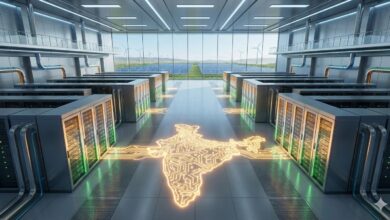Centre Aims to Transform Goa into a Mini Silicon Valley

Union Minister of Commerce and Industry Piyush Goyal recently shared an ambitious vision: to transform Goa into a “Mini Silicon Valley,” fostering a thriving tech and innovation ecosystem. This initiative is part of India’s broader goals to enhance technological self-reliance, generate high-quality employment, and attract global investment. Through strategic investments in key sectors like semiconductors, electronics manufacturing, and data centers, the government envisions Goa as a burgeoning destination for high-tech industries.
Goa’s selection as a tech hub may seem unconventional, given its identity as a popular tourist destination. However, its connectivity, infrastructure, and growing entrepreneurial ecosystem make it an ideal choice. The state is well-connected by air, rail, and road to major cities like Mumbai and Bengaluru, providing logistical support for tech operations. Additionally, Goa’s high literacy rate and appeal as a lifestyle destination make it well-suited to attract and retain skilled talent.
The state has made strides to diversify its economy in recent years. Tourism, although a significant contributor, has faced volatility, particularly during the COVID-19 pandemic. Shifting toward technology and innovation aligns with Goa’s goal to build a more resilient and sustainable economy. Establishing Goa as a “Mini Silicon Valley” presents an opportunity for the state to attract international interest and foster a tech-driven economic model.
A critical component of this initiative is developing advanced infrastructure. Goa currently has 23 industrial estates, which have already attracted substantial investments across pharmaceuticals, biotechnology, and light manufacturing. The government’s plan is to leverage these estates further, transforming them into specialised zones for high-tech industries. Through public-private partnerships (PPPs) and incentives, Goa aims to draw companies in semiconductor manufacturing, cloud computing, artificial intelligence, and data management.
One major project underway is a high-capacity data center, spearheaded by the Goa Information Technology Development Corporation (GITDC). This facility aims to serve as a secure data storage and processing hub for both domestic and international companies. A cloud-based data center is also being planned through a PPP, with the goal of making Goa a preferred location for data-intensive industries.
To further attract tech companies, the government is exploring incentives like tax benefits, streamlined processes for business setup, and tailored talent development programs. This comprehensive approach seeks to foster a self-sustaining ecosystem where tech companies can start, grow, and thrive.
The goal for Goa is not merely to replicate Silicon Valley but to create a technology ecosystem suited to India’s unique strengths and needs. Silicon Valley’s success stems from its high concentration of tech talent, collaborative culture, and strong network of venture capital investment. However, replicating Silicon Valley requires adapting its successes to Goa’s distinct landscape.
Piyush Goyal highlighted that the aim is not just to copy Silicon Valley but to surpass it by establishing a technology hub that is uniquely Indian and globally competitive. The plan for Goa includes building a collaborative culture where academia, industry, and government work together to drive technological breakthroughs. This vision aligns with the government’s goal to reduce dependency on imported technology and position India as a leader in the global tech ecosystem.
One challenge in establishing a tech hub in Goa is developing a skilled workforce. The government plans to address this by partnering with academic institutions to create specialised programs preparing graduates for careers in technology and advanced manufacturing. Institutions like the National Institute of Technology Goa (NIT Goa) and other universities can play pivotal roles by offering courses in software engineering, data science, and electronics.
Additional skill development programs, internships, and industry partnerships are expected to help build a steady pipeline of talent. This effort aims not only to attract new graduates but also to retain them with attractive job opportunities. Goa’s quality of life, combined with promising professional prospects, could serve as a strong draw for talent, making it a unique alternative to busier tech hubs.
The state also aims to attract experienced professionals from other regions and countries. Goa’s lifestyle, along with high-quality career options, offers an appealing balance for professionals looking for a work-life equilibrium.
Turning Goa into a high-tech hub requires careful consideration of its environmental impact. Goa’s ecosystem, including its beaches and biodiversity, is integral to its identity and economy. As such, the transformation emphasises sustainable development practices. For instance, data centers could adopt renewable energy sources to minimise their carbon footprint, while tech manufacturing facilities will be expected to adhere to strict environmental regulations to protect the state’s natural resources.
The government has also committed to ensuring that this transformation benefits the local population. Programs to upskill workers, support small and medium enterprises, and promote fair hiring practices are part of a broader strategy to make the initiative both sustainable and socially inclusive.
While the vision for a Mini Silicon Valley in Goa is promising, several challenges remain. First, attracting tech giants and high-tech manufacturers requires substantial initial investment in infrastructure. While the government has pledged support, the successful execution of the plan will require collaboration with private-sector partners willing to invest in the state’s long-term development.
Goa’s relative lack of experience in high-tech manufacturing also presents a challenge. Transitioning from light manufacturing to advanced sectors like electronics and semiconductor production will require not only investment but also time and expertise.
Balancing Goa’s existing economic framework with the demands of a tech hub is another challenge. Tourism remains a major industry in the state, and any industrial development must ensure that it complements rather than disrupts traditional economic pillars or the state’s cultural appeal.
The government’s vision to transform Goa into a Mini Silicon Valley represents an exciting and ambitious opportunity to redefine the state’s economic landscape. By building a high-tech ecosystem with robust infrastructure, data centers, semiconductor manufacturing, and a skilled workforce, Goa could emerge as a leader in India’s tech future. The success of this initiative would not only diversify Goa’s economy but also position India as a significant player in global high-tech industries.
If successful, the Mini Silicon Valley initiative could serve as a model for other states seeking to foster innovation, create jobs, and build resilient economies. With a balanced approach that respects Goa’s unique environment and cultural heritage, this transformation could become a cornerstone of India’s vision for a self-reliant and technologically advanced future.





